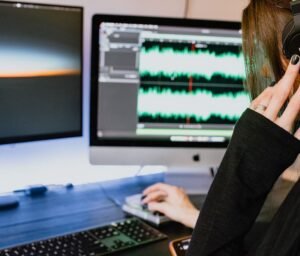Top AI Labs in the World
Artificial Intelligence (AI) is rapidly advancing, and the research and development of AI technologies are being carried out by various organizations around the world. These AI labs are at the forefront of innovation and are shaping the future of AI. In this article, we will explore some of the top AI labs in the world and the groundbreaking work they are doing.
Key Takeaways
- AI labs are driving innovation and pushing the boundaries of technology.
- These labs focus on research and development across various AI domains.
- Collaboration and partnerships between AI labs are essential for progress in the field.
- AI labs contribute to solving real-world problems and have societal impact.
1. OpenAI: OpenAI, founded by Elon Musk and others, is dedicated to building safe and beneficial AI. They focus on long-term research and aim to ensure the benefits of AI are distributed widely.
* One interesting project undertaken by OpenAI is GPT-3, a state-of-the-art language model that can generate human-like text.
2. DeepMind: DeepMind, a subsidiary of Google’s parent company Alphabet, is renowned for its advancements in AI. They have made significant breakthroughs in game playing, healthcare, and robotics.
* An interesting application of DeepMind’s AI is AlphaGo, which defeated the world champion in the ancient game of Go, showcasing AI mastery.
AI Lab Rankings
| Rank | AI Lab | Location |
|---|---|---|
| 1 | OpenAI | United States |
| 2 | DeepMind | United Kingdom |
| 3 | Facebook AI Research | United States |
3. Facebook AI Research (FAIR): FAIR is committed to advancing AI through open research and collaboration. They focus on areas like natural language processing, computer vision, and reinforcement learning.
* FAIR‘s innovative project called Detectron2 is a software library for object detection and image segmentation.
AI Lab Funding Comparison
| No. | AI Lab | Funding Amount (USD) |
|---|---|---|
| 1 | OpenAI | $1 billion |
| 2 | DeepMind | $600 million |
| 3 | Facebook AI Research | $10 million |
4. MIT Computer Science & Artificial Intelligence Laboratory (CSAIL): CSAIL is one of the world’s leading AI research labs. They work on various aspects of AI, including robotics, machine learning, and computer vision.
* CSAIL’s unique research explores the challenge of teaching robots to learn from human feedback for improved human-robot interactions.
5. Microsoft Research AI: Microsoft Research AI focuses on developing AI technologies that are accessible and useful to people. Their research covers a wide range of areas such as healthcare, gaming, and natural language processing.
* Microsoft Research AI is working on a project to develop an AI-powered virtual assistant that can understand and respond to human emotions.
AI Lab Collaboration
- AI labs often collaborate with universities, government agencies, and industry partners to leverage expertise and resources.
- Collaboration accelerates progress, fosters knowledge sharing, and enables access to diverse datasets.
As AI continues to advance, these top AI labs play a crucial role in driving innovation and shaping the future of AI. Their contributions extend beyond the labs and have a global impact. With ongoing collaboration and continued investment in research, AI labs are pivotal in unlocking the immense potential of artificial intelligence.

Common Misconceptions
1. AI Labs are only found in Silicon Valley
One common misconception is that the top AI labs are exclusively located in Silicon Valley. While it is true that Silicon Valley is a notable hub for tech innovation, there are several AI labs around the world that have made significant contributions to the field.
- AI labs are geographically diverse, with leading labs situated in various countries.
- The growth of AI technology has prompted the emergence of AI labs in different regions.
- Collaborative efforts between labs worldwide have resulted in groundbreaking advancements.
2. Only large corporations can have top AI labs
Another misconception is that only large corporations with extensive resources can house top AI labs. While big companies like Google and Microsoft do have well-established AI labs, there are also smaller companies and research institutions that are actively contributing to the advancement of AI technology.
- Startups and smaller companies often have more flexibility and agility in exploring new AI techniques.
- Research institutions and universities also make significant contributions to AI innovation.
- Collaborations between large corporations and smaller entities further enhance the AI research landscape.
3. AI labs are solely focused on building autonomous robots
Many people mistakenly believe that AI labs are primarily focused on developing autonomous robots. While robotics is undoubtedly an important aspect of AI, top AI labs are involved in a wide range of projects and research areas that extend beyond just robotics.
- AI labs are engaged in natural language processing, computer vision, machine learning, and more.
- Research in healthcare, finance, and other industries benefits from the advancements made in AI labs.
- AI labs constantly explore new applications and possibilities for AI technology.
4. AI labs always work in secrecy
Another common misconception is that AI labs operate in complete secrecy, making it impossible to know what they are working on. While some aspects of their research may be kept confidential, many AI labs actively share their findings and collaborate with the wider research community.
- AI conferences and research publications regularly feature work from top AI labs.
- Open-source initiatives by AI labs contribute to the democratization of AI technology.
- AI labs often collaborate with other institutions, fostering an environment of knowledge sharing.
5. AI labs will replace human intelligence
A final misconception is the notion that AI labs are solely focused on creating technology that will replace human intelligence. In reality, the goal of AI labs is to augment human capabilities and assist in solving complex problems, rather than replace human intelligence altogether.
- AI technology is designed to enhance human decision-making and problem-solving processes.
- Collaborative projects between AI systems and humans often yield the best results.
- Ethical frameworks within AI labs prioritize responsible and beneficial use of AI technology.

Top AI Labs in the World
Artificial Intelligence (AI) has rapidly evolved and has become a crucial field for technological advancement. In recent years, several prominent AI labs have emerged worldwide, driving innovation, research, and development in this field. Here, we present a selection of the top AI labs in the world and highlight their notable contributions.
Innovation Leaders
The following table showcases AI labs known for their cutting-edge innovation and pioneering research:
| Lab | Location | Founded | Key Achievements |
|---|---|---|---|
| Google AI | California, USA | 2010 | Developed TensorFlow and achieved breakthroughs in deep learning. |
| Microsoft Research AI | Washington, USA | 1991 | Created Azure Cognitive Services and contributed to natural language processing advancements. |
| OpenAI | California, USA | 2015 | Produced state-of-the-art models like GPT-3 and pushed the boundaries of reinforcement learning. |
Leading Academic Institutions
Academic institutions play a significant role in AI research. The following table highlights leading AI labs affiliated with universities:
| Lab | University | Location | Key Focus Areas |
|---|---|---|---|
| MIT Computer Science and Artificial Intelligence Laboratory (CSAIL) | Massachusetts Institute of Technology | Massachusetts, USA | Robotics, computer vision, natural language processing. |
| Stanford AI Lab | Stanford University | California, USA | Machine learning, computer vision, autonomous systems. |
| University of Toronto Machine Learning Group | University of Toronto | Toronto, Canada | Deep learning, reinforcement learning, generative models. |
Global Collaborations
In the rapidly growing AI landscape, international collaborations are vital for knowledge sharing and breakthroughs. The table below presents labs engaged in global collaborations:
| Lab | Collaborating Countries | Key Research Areas | Notable Partnerships |
|---|---|---|---|
| DeepMind | United Kingdom, Canada, France, United States, and more. | Game playing algorithms, healthcare applications, generative models. | Partnerships with NHS, IBM, and leading academic institutions. |
| Facebook AI Research (FAIR) | United States, France, Germany, Israel, and more. | Computer vision, natural language processing, reinforcement learning. | Collaborations with INRIA, Max Planck Institute, and Tel Aviv University. |
| AI Singapore | Singapore | Data analytics, intelligent systems, AI governance. | Partnerships with various government agencies, local universities, and industry partners. |
Industry Giants
Large corporations often establish dedicated AI labs to drive innovation within their organizations. The following table features leading AI labs within industry giants:
| Lab | Company | Location | Key Contributions |
|---|---|---|---|
| IBM Watson Research | IBM | New York, USA | Pioneered AI technologies, including IBM Watson and contributed to quantum computing advancements. |
| Baidu Research | Baidu | Beijing, China | Developed DeepSpeech and advanced natural language processing techniques. |
| Amazon AI | Amazon | Washington, USA | Created Amazon Alexa and contributed to various machine learning applications. |
Startups Shaping the Future
In the dynamic AI ecosystem, startups play a crucial role in driving innovation and disrupting existing technologies. The table below presents noteworthy AI labs within startups:
| Lab | Startup | Location | Key Innovations |
|---|---|---|---|
| OpenAI | OpenAI | California, USA | GPT-3 language model, reinforcement learning advancements. |
| DeepMind | DeepMind | London, United Kingdom | AlphaGo, AlphaFold, cutting-edge AI research. |
| UiPath AI Lab | UiPath | New York, USA | Automation technologies, intelligent process automation. |
Funding and Investment
Financial support is crucial for AI labs to thrive. The table below illustrates notable funding and investments in leading AI labs:
| Lab | Funding Source | Investment Amount (USD) |
|---|---|---|
| OpenAI | Microsoft | 1 billion |
| DeepMind | Alphabet Inc. | 600 million |
| Facebook AI Research (FAIR) | Up to 10 million per year for research grants |
Government Initiatives
Government support is instrumental in fostering AI research and development. The following table showcases key AI labs backed by government initiatives:
| Lab | Country | Area of Focus | Government Support |
|---|---|---|---|
| AI Research Center | China | AI technology development, application, and talent cultivation. | National AI Development Plan, strategic investments by the Chinese government. |
| AI Singapore | Singapore | AI awareness, research translation, industry adoption. | Government-funded initiative supported by the National Research Foundation. |
| AI Research Center | United States | Advancing AI technology, standards, and ethical guidelines. | National AI R&D Strategic Plan, collaboration with academic institutions and industry partners. |
Collaborations for Social Good
AI labs actively collaborate to address global challenges and contribute to the collective well-being of society. The table below presents labs involved in collaborations for social good:
| Lab | Collaborating Organizations | Social Impact |
|---|---|---|
| Google AI | World Health Organization (WHO), UNICEF, various NGOs. | AI-driven healthcare solutions, disaster response, environmental conservation. |
| Microsoft AI for Good | Various nonprofits and humanitarian organizations. | AI applications to tackle climate change, human rights abuses, accessibility challenges. |
| The Partnership on AI | Leading technology companies, human rights organizations. | Ethical use of AI, policy development, and responsible AI deployment. |
Influential AI labs worldwide continually reshape the landscape of technology, revolutionizing various sectors and pioneering breakthroughs. By fostering innovation, advancing research, and collaborating to address society’s challenges, these labs drive the relentless pursuit of pushing AI’s boundaries and shaping our future.
Top AI Labs in the World
Frequently Asked Questions
What are some top AI labs in the world?
What are the research areas of these AI labs?
What kind of projects do these AI labs work on?
Are these AI labs involved in collaborations or partnerships?
What are the notable achievements of these AI labs?
Do these AI labs offer internships or research opportunities?
Are these AI labs involved in AI education and training?
Can individuals access the AI technologies developed by these labs?
How can one stay updated with the latest developments from these AI labs?
How can someone collaborate with these AI labs?




